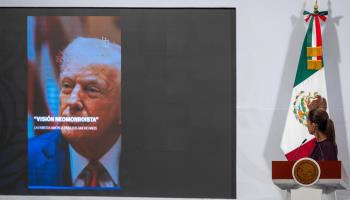President Claudia Sheinbaum, and by extension Mexico, have maintained a calm, dignified image in the face of US pressure
President Claudia Sheinbaum on August 19 rejected US claims that a bilateral security agreement was reached with Mexico, emphasising Mexico’s willingness to collaborate but saying she would not confirm any US statement made without her government having been consulted. Sheinbaum’s handling of Washington has become characterised by a calm, cooperative but firm stance that appears to have gained respect on both sides of the border.
What’s next
Sheinbaum will maintain efforts to reduce northward drug and migrant flows, placating Washington while defending Mexican sovereignty. Further extraditions of wanted criminals to the United States will foster goodwill as negotiations on security and trade accords advance. Further delays in reaching agreement on the latter are likely, though Washington may demand early renegotiation of the US Mexico-Canada Agreement, currently scheduled for review by July. Freer trade is unlikely, but a new long-term arrangement would provide certainty to producers, consumers and investors.
Subsidiary Impacts
- US protectionism and domestic uncertainty (due to judicial reform, for example) will hit foreign direct investment in Mexico.
- The government will be pressed to eliminate barriers to US exports to reduce Mexico’s US trade surplus.
- Migration crackdowns may hit remittance flows into Mexico, exacerbating poverty and expanding the current account deficit.
Analysis
Sheinbaum and US President Donald Trump were widely expected to have a tense relationship, representing ideologically opposing positions and with Trump, at times, voicing open derision towards Mexico and its people. Points of potential contention between the leaders abound, most obviously migration, drug and arms trafficking, and trade — due both to Mexico’s perceived failure to prevent Chinese exporters from using the country as a back door to the United States (see MEXICO: US-China trade role will be substantial – April 5, 2024) and to Mexico’s bilateral trade surplus.
The latter is a major issue for Trump, who considers deficits to represent financial losses. In 2024 the US trade deficit with Mexico was USD171.5bn — its second-largest after the USD295.4bn recorded with China. In January-June 2025, the deficit with Mexico stood at USD96.2bn — up 16.7% on the USD82.4bn recorded during the year-earlier period. Notably, in May and June, Mexico’s trade surplus with the United States was larger than that of China.
Neither drama nor clashes
While US-Mexican relations have been far from smooth, the relationship has been considerably less fraught than it might have been.
Sheinbaum has avoided quick responses to Trump’s announcements, arguing the importance of keeping a “cool head”. With Trump regularly backtracking on his positions, that strategy has proven wise. While some might argue that she has a weak hand and little alternative but to accept Washington’s actions, she has also avoided the temptation to pursue nationalist, anti-US rhetoric — a move that would have been popular with many Mexicans, but which ultimately would have fostered greater instability.
While high-profile spats have erupted between Trump and other Latin American leaders, most notably Colombian President Gustavo Petro and Brazilian President Luiz Inacio Lula da Silva (see LATIN AMERICA/US: Transactional ties will be turbulent – March 19, 2025 and see BRAZIL: Tariff threat may boost beleaguered government – July 15, 2025), Sheinbaum appears to have managed her relationship with him skilfully, avoiding any escalation of tensions.
Tariffs
Nowhere has that been more obvious than in the area of tariffs. From the beginning of his presidency, Trump has pursued tariff hikes against foreign partners, several of which (notably China) have retaliated (see CHINA: US trade truce buys time for a limited deal – May 22, 2025).
Despite publicly considering the possibility of enacting tariffs against certain US products (perhaps even targeting producers in areas known to be strongholds of Trump’s Republican Party) the Sheinbaum administration has refrained from retaliating and is no longer discussing it as a possibility.
Sheinbaum has refrained from retaliatory tariff action
Instead, Shainbaum’s official response to Trump’s initial tariff threats, in April, was to announce a strengthening of her economic programme — ‘Plan Mexico’ — to boost food and energy sovereignty, without any protectionist moves against the United States (see MEXICO: Government development plan looks optimistic – May 2, 2025).
She further stated she would aim to reduce Mexico’s imports, but only from countries with which Mexico lacked a free trade agreement (essentially China). In that sense, she not only set out a plan to blunt the impact of any US tariffs, but also avoided retaliatory tariffs that would hit domestic consumers, and even gave Washington a reason actively to welcome her response.
Since then, Sheinbaum has secured a further high-profile win, with Trump announcing on July 31, after a 40-minute phone conversation with his Mexican counterpart, that he would postpone for 90 days the imposition of a 30% tariff on Mexican imports in order to make time to reach a trade agreement. Numerous factors (many domestic) were likely behind this decision, but the call with Sheinbaum is perceived to have clinched the postponement deal.
Security Cooperation
Sheinbaum’s government has taken action in several areas to satisfy Trump,notably boosting efforts to tackle drug cartels, particularly those trafficking fentanyl. In doing so, Sheinbaum has shelved the non-confrontational ‘hugs not bullets’ policy of former President Andres Manuel Lopez Obrador (AMLO, 2018-24) and abandoned his position of denying the existence of fentanyl production in Mexico.
US agencies reportedly seized 5,302 pounds (2.4 metric tonnes) of fentanyl along the US-Mexico border in January-July 2025 — a marked drop compared to the 12,300 pounds seized in the same period of 2024 and the 16,300 pounds seized in January-July 2023. With Sheinbaum having taken office in October 2024, credit for the reduction since 2023 cannot be attributed entirely to her policies; factors such as Chinese restrictions on exports of precursor chemicals, or improved cartel smuggling techniques, may also be at play. However, the plunge this year compared to last is notable, and will not have gone unnoticed in Washington.
Falling fentanyl seizures reflect well on Sheinbaum
The Sheinbaum administration has also reversed a previous policy of not extraditing Mexican prisoners wanted by US authorities. In February (just days after Washington designated six Mexican criminal groups ‘foreign terrorist organisations’) Mexico extradited 29 individuals, including:
- former Guadalajara Cartel leader Rafael Caro Quintero;
- former Juarez Cartel leader Vicente Carrillo Fuentes; and
- former Zetas Cartel leaders Miguel Angel Trevino and Alejandro Trevino.
Such a mass extradition was unprecedented, but has since been repeated. In August, 26 people were sent to the United States. Although they were not as notorious as those extradited in June, the group still included important figures from the Sinaloa and New Generation Jalisco Cartels.
Sinaloa Cartel co-founder Ismael ‘El Mayo’ Zambada (one of Mexico’s most high-profile criminals) pleaded guilty in a US court this week to drug trafficking charges. He was arrested on US soil, rather than being extradited, but Sheinbaum was quick to hail his plea, noting that it highlighted the importance of the United States and Mexico working together.
That need for collaboration, as equal, independent neighbours, is a point she has consistently underlined, refusing to engage in damaging wars of words, while staunchly defending Mexico’s sovereignty. She calmly rejected claims by Trump in July that Mexican authorities were “petrified” of drug cartels, and has consistently downplayed threats of unilateral US military action on Mexican soil, de-escalating tensions which, handled differently, could easily develop into diplomatic crises.
Outlook
In his July 31 announcement postponing tariff hikes, Trump described his call with Sheinbaum as having been “very successful”, adding that “more and more, we are getting to know and understand each other” — a remarkable claim given his generally aggressive stance towards Mexico.
The details of a final trade deal remain uncertain, but Sheinbaum’s general approach towards the United States has laid a foundation for constructive talks amid the rhetoric of discord. Negotiations at least look likely to be held in a spirit of mutual respect, maximising the possibility of positive outcomes.



